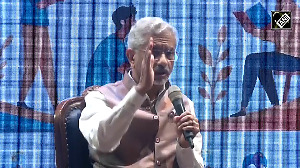The hype and the excitement around the implementation of conditional access system is building up.
Rakesh Mohan, joint secretary-information and broadcasting ministry was very clear when he said, "The six-month time limit was arrived at after getting the feedback from the industry and now that the date has been set, and the industry will have to implement CAS at the said date."
Mohan was speaking on Saturday on Conditional Access Systems -- a Mid-Term Review at Ficci-FRAMES 2003, a three-day global convention of the entertainment industry.
The joint secretary dismissed the notion that the delay was owing to the government's failure in clearly outlining the terms and references for the basic tier. It is largely happening because the business plans of the stakeholders off the ground are not in place, he said.
He stressed on the fact that the government was only a facilitator in this entire process and warned, it is high time that stakeholders in the business realise the seriousness of the issue and not stretch matters any further.
This session was represented by all the sections of the industry. The Delhi-based Cable Networks Association general secretary Rakesh Datta, speaking on behalf of last mile operators, said, "It was we who asked for CAS implementation in order to bring about a regulation within the cable industry."
He added that consumers concerns were unfounded as India had the lowest cable subscription rates in the world. And pleading that it was the consumer who would lose out.
Datta said, "Local cable operators represented the last line of defence against the vertically integrated monopolies. And for this industry not to perish, a fair price for the basic tier is needed."
He said the association has put forth a proposal to the task force that the fair price for the basic tier should be Rs 180.
According to Datta, whether the basic tier was priced at Rs 180 or even below Rs 100, it would not affect the final pricing of the bouquets as the broadcasters would rework their pricing strategies accordingly.
Datta also said, "We at our end are also ready to roll out and place orders, but we cannot do so until we have some information on the how many pay channels are going to be there."
Hinduja TMT, executive president, Ashok Mansukhani, said his network InCablenet was also ready and waiting to roll out CAS. Mansukhani said INCableNet would be ready to roll ahead of the 14 July deadline.
In his presentation he said, "CAS would be a win-win for all segments, including the consumers and cable operators. It would offer consumers several value added services such as access to the Internet, video on demand, e-mail/SMS, voice telephony, gaming, electronic program guide, pay per view and mobile messaging internet advertising."
Cable operators on the other hand would benefit from the launch of new services, which would bring additional revenues, he added.
On the free-to-air pricing, Mansukhani said, "We expect average price to be about Rs 100. Deducting Rs 30 as entertainment tax, the balance left would be Rs 70 for 35 channels, which is the lowest in the world."
Referring to the pending actions, he said the cable industry's plea for duty reductions has been ignored despite assurances from the finance ministry.
As the government has decided to fix a maximum retail price for the free-to-air channels, it should have frozen all current pay channel rates as on January 2002 till CAS comes into effect in the various cities, he added.
On the issue specific to whether there were chances that some of the pay channels within certain bouquet could go free to air, Jawahar Goel, head of SitiCable, Zee Telefilms' cable arm clarified there would be no question of any Zee bouquet channel turning free to air and that he was all for DTH.
An interesting point was made by Shantonu Aditya, chief executive officer, One Alliance bouquet (SET-Discovery) at the beginning of the session.
He stressed that customers as well as industry people needed to be educated about the implications of CAS so as to make the transition more smooth.
"There is a need to create awareness among customers about their right to choose what they want to see and pay for only that, he said.
Hathway Cable's chief executive officer, K Jayaraman also alluded to what Aditya had said about the consumers needing to be educated about what CAS was all about.
Aditya, further added, emphasising on the rollout issue, the availability of the set-top boxes and cheap financing options available to the customer would make the transition faster.
There are some issues related to the technology and quality, but it will be sorted out in phases.
If CAS is implemented properly, it will definitely be a boon for the industry, as various issues which the industry are facing acutely, will be to a great extent resolved.
Talking on the post-CAS scenario, foresaw bundling of channels there also. Aditya did not disclose any pricing strategy, but said there would be differential pricing. All broadcasters would do the pricing depending on the demand in different territories, he said.
Zee Turner, CEO, Sunil Khanna, said there would certainly be a cost attached to the STBs that would have to be borne by the consumer and those that were advocating that it be underwritten by the industry were on a wrong track.
Khanna said efforts needed to be made to make the transition as seamless as possible and for that all the stakeholders in the value chain, consumers, LMOs, MSOs, broadcasters and the regulatory authorities needed to be working in tandem rather than at cross purposes.
CASBAA, CEO, Simon Davies sounded very positive about the future of the industry in India. Pointing to the experience of other Asian countries such as Japan, Thailand, Hong Kong and Singapore, he said that India would ultimately get it right.






 © 2025
© 2025